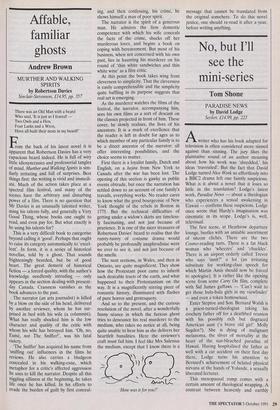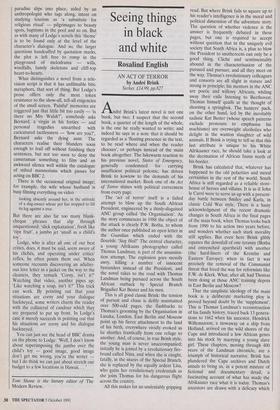No, but I'll see the mini-series
Tom Shone
PARADISE NEWS by David Lodge Secker, .£14.99, pp. 223 Awriter who has his book adapted for television is often considered more sinned against than sinning. The jury likes the plaintative sound of an author moaning about how his work was 'shredded,' his ideas 'travestied'. But the fact that David Lodge turned Nice Work so effortlessly into a BBC2 drama left one faintly suspicious. What is it about a novel that it loses so little in the translation? Lodge's latest work, Paradise News — about a theologian who experiences a sexual awakening in Hawaii — confirms these suspicions. Lodge once wrote that Hardy's imagination was cinematic in its scope. Lodge's is, well, televisual.
The first scene, at Heathrow departure lounge, bustles with an amiable assortment of sitcom clichés. There are the two Cosmo-reading tarts. There is a fat black woman who 'wheezes' and 'chuckles'. There is an airport orderly called Trevor who says 'innit?' a lot (an irritating substitute for working-class speech for which Martin Amis should now be forced to apologise). It is rather like the opening scene from some Carry On film, complete with Sid James guffaws — 'Can't wait to get those hula-hula girls in my viewfinder' — and even a token homosexual.
Enter Steptoe and Son. Bernard Walsh is a priest-turned-theologian taking his crochety father off for a deathbed reunion with his possibly rich but disgraced American aunt ea brave old girl': Molly Sugden?). She is dying of malignant melanoma, the sliver of mortality at the heart of the sun-bleached paradise of Hawaii. Having hospitalised the father as well with a car accident on their first day there, Lodge turns his attention to Bernard's achievement of belated physical nirvana at the hands of Yolande, a sexually liberated lecturer.
This menopausal romp comes with a certain amount of theological wrapping. A contrast between heavenly and earthly paradise slips into place, aided by an anthropologist who tags along, intent on studying tourism as 'a substitute for religious ritual' — pilgrimages to beauty spots, baptisms in the pool and so on. But as with many of Lodge's novels this 'theme' is to be found only at the level of the character's dialogue. And so, the larger questions handcuffed by quotation marks, the plot is left free to romp in the playground of melodrama — wills, windfalls, family skeletons and cliff-top heart-to-hearts.
What distinguishes a novel from a tele- vision script is that it has unfilmable bits: metaphors, that sort of thing. But Lodge's prose offers only the most token resistance to the show-all, tell-all exigencies of the small screen. 'Painful' memories are triggered just that little bit too easily — 'is there no Mrs Walsh?', somebody asks Bernard, a virgin in his forties — and personal tragedies unearthed with caricatured tactlessness — 'how are you?', Bernard asks the dying aunt. The characters realise their blunders soon enough to trail off without finishing their sentences, but not too soon to deny the cameraman something to film and an awkward silence well within the catalogue of stilted mannerisms which passes for acting on BBC 2.
There is the occasional original image; for example, the wife whose husband is busy filming everything on video
looking absently around her, in the attitude of a dog-owner whose pet has stopped to lift its leg against a tree.
But there are also far too many blank- cheque phrases that slip through unquestioned: 'slick exploitation', fresh like 'ripe fruit', a jumbo jet 'small as a child's toy'.
Lodge, who is after all one of our best critics, does, it must be said, seem aware of his clichés, and operating under critics' reflex, he often points them out. When someone recounts discovering an adulter- ous love letter in a jacket on the Way to the cleaners, they remark 'Corny, isn't it?' Watching that video, another pipes up: 'Like watching a soap, isn't it?' This trick can work. By pointing out that your situations are corny and your dialogue hackneyed, some writers charm the reader with the collateral of candour which they are prepared to put up front. In Lodge's case it merely succeeds in pointing out that his situations are corny and his dialogue hackneyed.
You can just see the head of BBC drama on the phone to Lodge: 'Well, I don't know about superimposing the jumbo over the child's toy — good image, good image don't get me wrong, you're the writer — but I do think we can just about stretch our budget to a few locations in Hawaii.
Tom Shone is the literary editor of The Modern Review.



















































 Previous page
Previous page